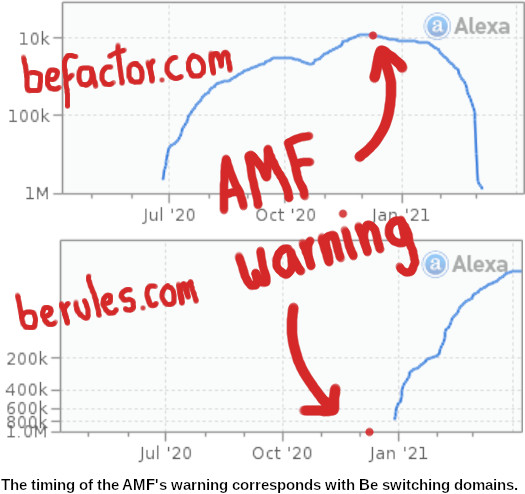
At the time I noted Be had changed their website domain from “befactor.com” to “berules.com”.
Considering the Be reboot of Melius was not that old itself, I flagged this as a strange.
MLM companies don’t change their website domain on a whim.
For all my poking around though, I couldn’t figure out why Be abruptly changed their website domain.
Today that mystery was solved.
Back on December 2nd, Quebec’s Autorite Des Marches Financiers issued a fraud warning against BeFactor.
As per the AMF’s warning,
BE Factor is not registered with the AMF in any capacity whatsoever and is therefore not authorized to act as a securities or derivatives dealer or adviser in Québec.
BE Factor is based in Dubai, United Arab Emirates. It is not registered with Corporations Canada or the Québec enterprise registrar (REQ).
BE Factor entices people with the promise of acquiring wealth with little effort and no foreign exchange or cryptocurrency knowledge.
A number of individuals and groups operating in Québec have been identified as promoting BE Factor products and services.
The AMF is currently taking steps to put an end to solicitation by these individuals and groups, which is being conducted primarily through social media.
The AMF reminds the public that there is no such thing as a high return without a high degree of risk and that foreign exchange and cryptocurrency markets are complex and volatile.
This is an interesting take from the AMF, as typically non-passive investment schemes aren’t seen as securities.
Apparently as per the laws in Quebec, Be offering signals through their apps requires them to register as a “securities or derivatives dealer or adviser”.
They’re 100% right on their pyramid concerns though (recruitment of new members). We’ve flagged Be as a pyramid scheme since its original Melius launch in 2018.
What specific effect the AMF’s warning had on Be’s business operations I can’t say. One possibility is payment processors and banking channels flagging the company as suspicious.
Whatever happened, Be was undeniably spooked.
You can plot the effect the AMF’s warning had on Alexa traffic charts for Be’s two website domains:
At the time of publication Alexa ranks the top sources of traffic to Be’s new website as the US (57%), Colombia (8%) and Canada (2%).
Bear in mind the AMF’s jurisdiction is Quebec. I’m not aware of Canada’s other provinces issuing their own Be warnings.
